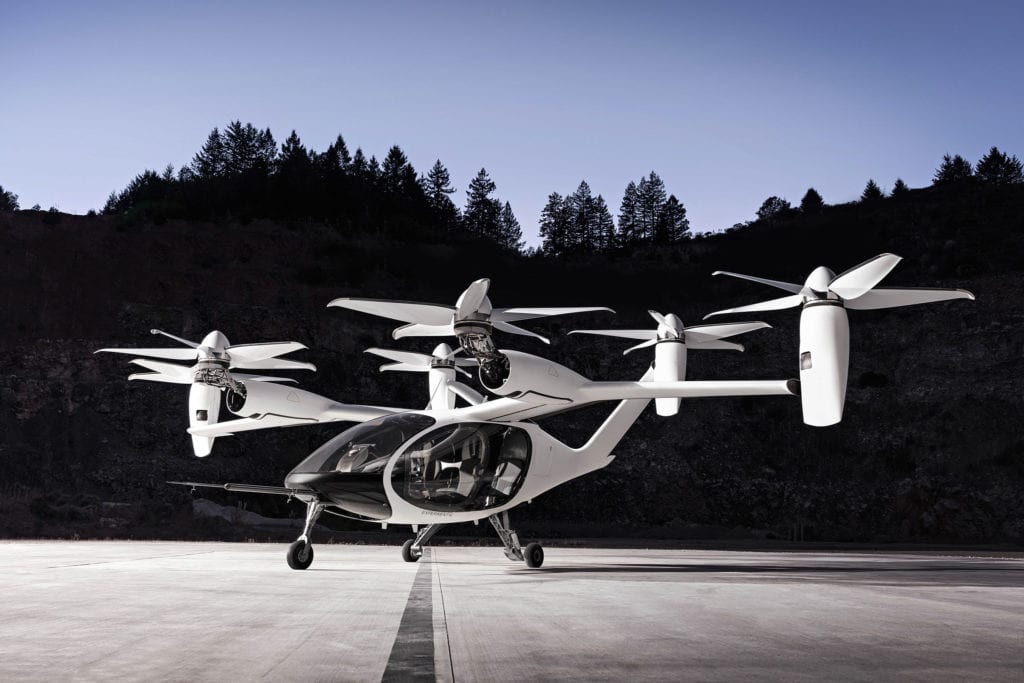
Joby Aviation reveals its eVTOL aircraft prototype, along with a $590 million Series C investment round led by Toyota. (Photo: Joby Aviation)
Joby Aviation has closed a $590 million Series C investment round led by Toyota Motor Company, which led the round with a $394 million investment.
Along with the financial backing, Toyota will partner with Joby to share “expertise in manufacturing, quality, and cost controls to support the development and production of our breakthrough electric vertical takeoff and landing aircraft.”
Joby also revealed images of its S-4 prototype for the first time, along with new performance details. The all-electric, six-rotor aircraft can carry a pilot and four passengers up to 150 miles on a single charge, according to the company, reaching speeds up to 200 miles per hour — with an acoustic footprint “100 times quieter than a conventional aircraft during takeoff and landing, and near-silent when flying over,” according to the company.
In December, Joby was announced as the seventh vehicle partner to join Uber’s Elevate ecosystem, through which the company intends to launch commercial aerial rideshare services by 2023. Joby is the only partner to date that has committed its aircraft will meet that timeline.
Toyota’s investment comes as a number of aircraft OEMs — and automakers, believing peak auto sales are behind them — seek to secure their place in the future of transportation. The future Uber Air platform was significantly strengthened by its partnership with Joby, which many in the industry believe to have the most advanced eVTOL technology. The addition of Hyundai’s S-A1 vehicle concept, announced earlier this month, also brings large-scale manufacturing expertise to Uber’s ecosystem, albeit on a late-2020s timeframe.
Over the past year, many OEMs have sought to either create their own platform — such as Bell, announcing its AerOS digital infrastructure play, and Boeing, partnering with Kitty Hawk’s Cora to create a public-facing brand and platform it calls Wisk.aero. Blade Air Mobility, now the largest provider of civilian helicopter flights in the United States with a newly-added presence in Mumbai, is building a brand and platform that many OEMs and automakers interested in UAM see as a viable partner.

Photo: Joby Aviation
Joby is the first air taxi startup to announce investment of this scale, having previously raised $128.3 million, according to Pitchbook. Lilium and Volocopter, both based in Germany, followed closely behind, with war chests of $100.9 and $96.5 million, respectively.
“Nexa Capital anticipates that over $2 billion will go to other eVTOL start ups in 2020 alone,” commented Michael Dyment, managing partner of Nexa Capital Partners, which released a report on global urban air mobility markets last year predicting 1.29 billion UAM passengers by 2040 and a total direct market value of $318 billion.
Earlier this year, rumors swirled that Lilium is working to close a $400-500 million investment round, but that has not yet materialized (or been made public).
“As we recently predicted in our 2020 Emerging Technology Outlook research note, 2020 is now a record year for VC investment in the air taxi startup space,” Asad Hussain, mobility analyst at Pitchbook, told Avionics International. “This latest round eclipses the previous record high of $138.7 million invested in 2017 and showcases continued appetite for exposure to the air taxi space from nontraditional VC investors.”
“Although the air taxi industry faces significant technological and regulatory hurdles, we believe nontraditional VC investors such as auto manufacturers and corporates will shape the evolution of urban air mobility by funding startups in the space,” Hussain added.
Notable information shared by Joby along with these announcements:
- Certification: Joby began a formal certification program with the FAA in 2018 and “is in discussion” with a number of international regulators regarding the commercial operation of its aircraft.
- Safety: The aircraft can “fly with fewer” than six propellers, according to Joby, and is capable of performing conventional landings. The 150-mile range doesn’t include “ample reserve capacity,” and Joby intends operations to be conducted with a pilot.
- Autonomy: No information has been released regarding autonomy systems or future intent to remove the pilot.
- Operations: Joby plans to establish a Part 135 commercial aircraft operation and, outside of geographies where it will partner with Uber, expects to launch air taxi operations “either (1) its own rideshare service, or (2) in partnership with Uber and/ or other rideshare companies,” establishing commercial aircraft operations in each country of operation.
- Toyota: In addition to the partnership and $394 million investment, executive vice president Shigeki Tomoyamo will join Joby’s board of directors. Toyota was already an investor in Joby via its venture capital arm, Toyota AI Ventures.
- Joby is HIRING: Flush with new capital, the startup is hiring for 141 positions across all departments, according to the company website.
- No personal use: The aircraft will not be available for individual sale.
Other investors in Joby include SPARX Group, Intel Capital, Capricorn Investment Group, JetBlue Technology Ventures, Toyota AI Ventures, AME Cloud Ventures, Baillie Gifford and Global Oryx.
“Joby has been one of the leaders in the electric VTOL revolution since its founding in 2009, pushing the technology and inspiring the entire industry,” Mike Hirschberg, executive director of the Vertical Flight Society, told Avionics.
“They have developed one of the most elegant and capable solutions to the eVTOL challenge, and it’s fantastic that the company has finally revealed to the world what it has been working on.”